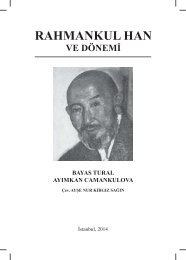THE SOVIET HISTORIOGRAPHY AND THE QUESTION OF KAZAKHSTAN’S HISTORY
SOVYET-TARIH-YAZICILIGI-ENG
SOVYET-TARIH-YAZICILIGI-ENG
You also want an ePaper? Increase the reach of your titles
YUMPU automatically turns print PDFs into web optimized ePapers that Google loves.
198<br />
<strong>THE</strong> <strong>SOVIET</strong> <strong>HISTORIOGRAPHY</strong> <strong>AND</strong><br />
With the nineteenth century, some spiritual stirs began to emerge<br />
in Volga-Ural region in favour of modernisation. Thus, local social identity<br />
began to engage in a sophisticated transformation process. This<br />
transformation emerged as a part of Ceditçilik reform movement and<br />
was attained thanks to the efforts of well-educated intellectual circles.<br />
In this process, the enterprises to learn the history of the region<br />
and to say new ideas had a particular role. In this regard, the prominent<br />
cleric, thinker, historian and educationalist Shihabeddin Merjani<br />
(1818-1889) took the first step. He went beyond the traditional<br />
history teaching concentrated on Volga Bulgarians and highlighted<br />
the periods of Golden Horde Empire and Kazan Khanate. Then, he<br />
established a link between Volga-Ural region and Central Asia and<br />
located his own nation’s history with the general Turkish history<br />
perspective for the first time. According to him, as a result of the mix<br />
of native Bulgarian and Kipchak elements with outsider Mongol-Tatar<br />
elements, the fundamentals of a new society and culture had been<br />
formed. The tradition of patriotism on this basis stemmed from the<br />
“Tatar” self-consciousness. 371<br />
In this way, he brought about for his society a new and broader<br />
point of view transcending the frontiers of Volga-Ural region. He<br />
invited his contemporaries to look beyond the period under Russian<br />
control and to be proud of their historical legacy crystallised under the<br />
name “Tatar”. Against the usage of “Bulgarian”, he proposed the name<br />
“Tatar”. He asserted that “Tatar” name should be used with dignity<br />
against Russian derogatory propaganda. In Kazan’ın ve Bulgar’ın Ahvali<br />
Konusunda Faydalanılan Haberler (Volume I: 1885, Volume II: 1900),<br />
he spoke against his contemporaries who refused to use the name<br />
“Tatar”: “Oh poor! You say that you are not a Tatar. However, you are<br />
also not an Arab, Tajik or Nogai; not a Chinese, Russian, French or<br />
German! If you are not a Tatar, then tell, who are you?” 372<br />
Merjani’s point of view significantly affected the intellectuals of<br />
Volga-Ural region, especially the reformist Ceditçiler. Between 1890 and<br />
1923, several history works championing the “pro-Tatar” point of view<br />
were introduced by the intellectuals of Kazan. Some of these historians<br />
are Fahreddin, G. Ahmerov, M. Remzi, G. Zebiri, H. Atlasi, K. Bikkulov and<br />
371 See: Shamiloglu, U., ”The Formation of a Tatar Historical Consciousness: Shihabuddin<br />
Marcani and Image of the Golden Horde”, Central Asian Survey, 1990, 9<br />
(2), pp. 39-49.<br />
372 Mercani, Sh., Müstafadi-l exbar fi ehval-i Kazan ve Bulgar [1885; 1900], Ya. G.<br />
Abdullin and E. N. Hayrullin (edt.), Tatarstan Kitap Neşriyatı, Kazan 1989, p. 44.



